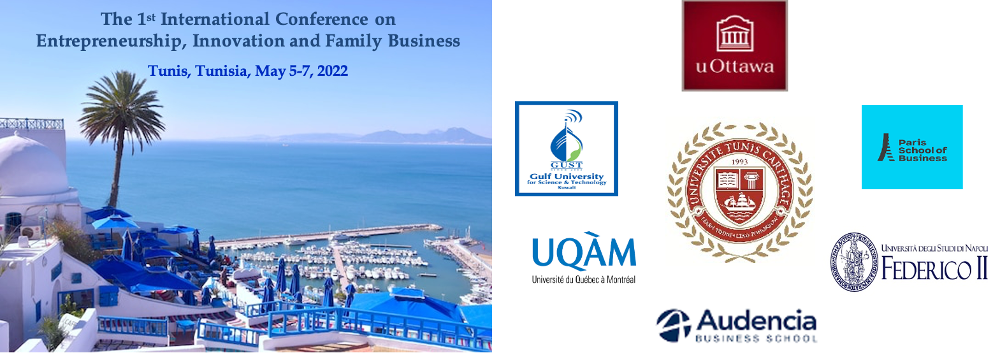
|
|
|
Call for Papers
Entrepreneurship, Innovation and Family Business in Africa and MENA Region Countries: Opportunities and Challenges in the Aftermath of Covid-19 You are invited to submit your papers to the International Conference on Entrepreneurship, Innovation and Family Business (ICEIFB). This international event will take place on May 5-7, 2022 at the Carthage Business School of the University Tunis Carthage, Tunisia. The conference aims to provide academics, policymakers and practitioners with a valuable forum for discussion and critical analysis of the major issues and challenges related to all areas of Entrepreneurship, Innovation, Family Business and Management in the Aftermath of Covid-19. The ICEIFB is organized by the University Tunis Carthage in collaboration with the University of Ottawa, the University of Quebec at Montreal, Paris School of Business, Audencia Business School, Gulf University for Science and Technology and theUniversity of Naples Federico II. The Middle East and North Africa (MENA) region and African countries become increasingly attractive actors in the global economy. Since the 2008 economic crisis and the Arab Spring, various countries have been trying to transform their economic, cultural and social standards to become more competitive and innovative. These transformations have generated a unique, but under explored, context that is full of insights on how to foster innovation and entrepreneurial capacities in these countries (Mellahi et al, 2011; Balakrishnan, 2013). Innovation and entrepreneurial capacities in the MENA region and African countries are facing more uncertain future with the outbreak of the coronavirus pandemic which is having unprecedented impacts across the globe, especially on human health and economic activities. Entrepreneurship represents a key driver for modern economies. Especially, entrepreneurship acts as a crucial enabler for the economic development of the African continent and the Middle East countries. However, the importance of entrepreneurship and its contributions vary according to the socio-economic contexts. Although these countries operate in different environments (social, economic, institutional and technological) and have significant national particularities in some aspects of the entrepreneurial pipeline, yet many similarities exist. Countries in these regions are both facing very similar challenges and have equivalent opportunities. Both regions have the highest youth population shares in the world, as well as the highest rates of youth unemployment. Also, across African and MENA regions, entrepreneurial intentions, too-early entrepreneurship rates and necessity-driven entrepreneurial activities are the highest in the world. Unfortunately, these high levels of enthusiasm are countered by a high number of failed businesses and limited growth potential for those businesses that survive. The obstacles preventing entrepreneurship from prospering range from lack of government support, weak entrepreneurial skills, difficulty in accessing funding, bureaucratic requirements, restrictive and biased regulatory conditions, lack of research and development, corruption, and social constraints, especially in the current context heavily impacted by the global health crisis. As highlighted by Ratten (2021), the uncertainty surrounding the COVID-19 pandemic has provided an impetus for entrepreneurship, especially for family firms (Kraus et al., 2020). At the same time, the societal shifts due to COVID-19 impacts unveil opportunities for entrepreneurial adjustments to achieve competitiveness and growth (Ratten, 2021). Therefore, there is an urgent need to build a healthy and strong entrepreneurial ecosystem in MENA region and African countries that nurtures, encourages and supports individuals to move on entrepreneurial intentions and actions in this context. In particular, it becomes necessary to deploy in these regions, substantial human, natural, technological and financial assets more efficiently through adopting economic, educational and social policies that create sustained inclusive economic growth and prosperous societies that deliver opportunities to all. A critical aspect of this is for policymakers and experts to focus on establishing a conducive environment in which entrepreneurs and innovators can emerge, compete and growth. Also, there is a need to establish more efficient entrepreneurship education systems, technology transfer programs and business incubation and acceleration mechanisms to increase knowledge of business concepts, gain an entrepreneurial mindset, support nascent entrepreneurs and improve innovative management practices to enable firms to growth. The focus on fostering an entrepreneurship climate should pursue to build and strengthen connections between different players within the entrepreneurial ecosystem. Still, it is important to note that African and MENA region countries are also paying more attention to innovation. According to the Global Competitiveness Indicators, some countries from this region are in the Bloomberg 2019 Innovation Index top innovative 60 countries, such as Tunisia, United Arab of Emirates, Iran, South Africa and Kuwait. However, much effort is still needed to develop innovation, family business and corporate entrepreneurship (Zahra, 2016) in these countries. From the international perspective, multinational corporations operating in these two regions are developing some strategic agility capabilities (Cunha et al, 2019) to deal with changing local context and be more innovative. Therefore, this context is on the cusp of a potential entrepreneurship gold rush. It offers opportunities for intra- and inter-regions cooperation. Entrepreneurs and managers in these regions need capital, technology, suppliers and markets. China, EU and some Arab countries among others, could be strategic partners in providing these essential components to foster entrepreneurial activities. This conference aims to explore various approaches to address entrepreneurship, innovation, and family business practices in Africa and MENA Region countries. Papers may address (but are not limited to) the following issues:
The conference scope is not limited to these themes. New ideas\theories\outlooks in all areas of Entrepreneurship, Innovation, and Family Business are welcomed! |

